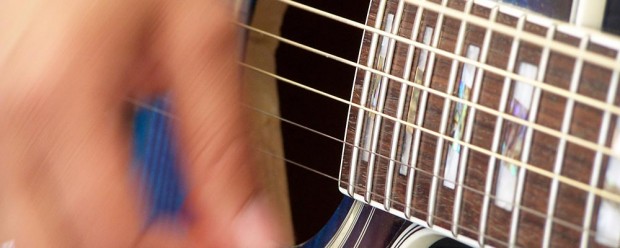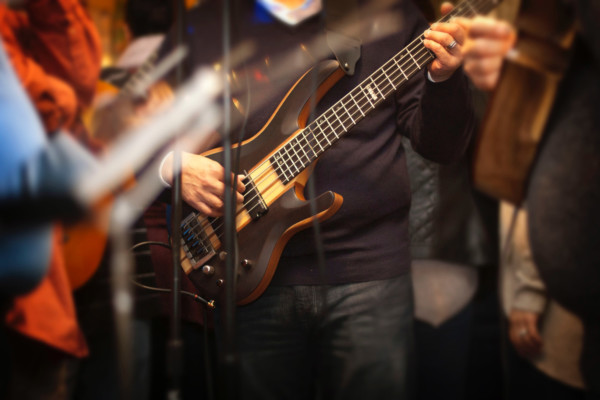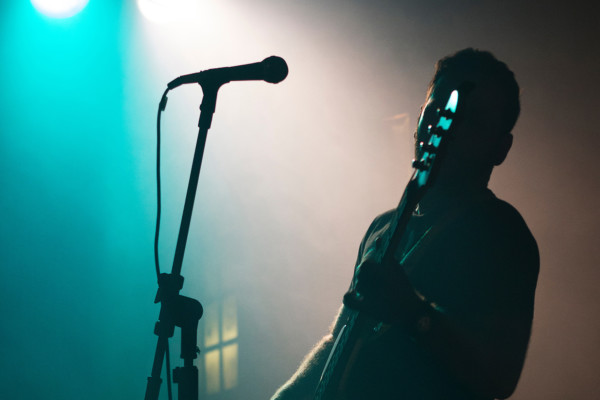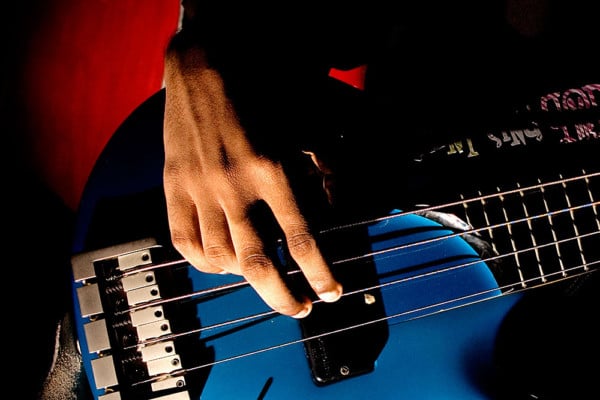Play Other Instruments! Such as… Guitar

In the previous column, we introduced an exciting concept: the importance of learning your way around on a few other instruments. Aside from being able to sit down at a piano or pick up an acoustic guitar, a bit of musical variety can influence your approach to the bass. Having some basic knowledge of piano can be a huge advantage, especially when it comes to reading music and figuring out scales, chords, and theory concepts. Similarly, playing guitar can give you greater insight into harmony, ear training, soloing, and songwriting.
Now don’t worry, owning a guitar does not negate your identity as a bass player. Instead, it can help your musical ear and give you the freedom to mess around on another stringed instrument. Since the bottom four strings are the same, it can be easy to pick up the instrument at start making music, just remember that the tuning of a 3rd (as opposed to a 4th) from the G to B strings can take some getting used to. Thanks to beginner chord books, guitar posters, Youtube videos, iPhone apps, and more, it’s easy to learn how to play a wide variety of chords. The hard thing is transitioning between them, holding down those itty bitty strings, and using a pick.
If you’ve never picked up a guitar before, a great way to get started is by learning the basic “open position” chords (C, G, A, Am, E, Em, D, etc.) and finding a few songs that you can strum along to. Your hands will get used to changing between chords, and you’ll start to create a mental picture of what these chords look like on the neck. This can be a big help when you’re trying to interpret what other guitar players are doing and if you’re trying to follow them in a jam or unrehearsed setting. If you’re familiar with the shapes the chords make, you’ll be able to look at a guitar player across the stage and identify the chord they’re playing… since someone yelling “D” can look a lot like yelling “C,” it’s easier (and more accurate) to look at the chord shape. Sometimes you can even guess the chord by looking at the back of the players’ hands, since us bass players are usually chillin’ behind them while they’re at the microphone.
When it comes to ear training, a bit of practice with a guitar can make a big difference. As someone who always struggled with identifying chord qualities (major, minor, diminished, augmented, 7th, 9th, etc.), I finally discovered that I was approaching practice the wrong way. I could easily play the arpeggios for different kinds of chords, but rarely jumped up the neck to play all of the voices at once. This gave me a very limited aural perspective since I got used to hearing the stream of notes, rather than the notes played together. Since guitar lends itself to chords, your ear will get more accustomed to hearing the chord as a whole, which can give you a more realistic perspective on harmony. You’ll hear the tension between the notes in the chord and will be able to identify when something changes, for instance, when someone is playing a major chord and then changes or adds a voice. Playing guitar, you’ll be able practice E Major, E minor, E7, E augmented, E9, and will hear the difference when you switch back and forth. Playing chord inversions or chords in different places on the neck can also help to diversify your ear.
To bring this knowledge over to the bass, it’s important to hear what the chords are so that you can improvise or embellish on your bass line. While it’s tempting to stick with just root notes or a repetitive line, you want to have the option to explore the neck and exercise some creativity… just make sure that you know what the chords are that you’re playing off of. Whether you’re arpeggiating, playing a walking line, or adding melodic fills, keep the chord quality in mind. Then, if you get into soloing, you want to have a good handle on more than just the chords… you want to understand how they move from one to the other and how the chords function in the progression.
Another great reason to pick up the guitar is for songwriting. If you’re an aspiring writer but don’t find the right inspiration from playing bass, guitar can be a really useful tool. You’ll be able to hear chord progressions (rather than just roots or a bass line) and you may find it easier to create melodic lines over hearing the full chords. If you’ve still got a long way to go before you can sing and play bass at the same time, try singing and strumming guitar. It’s far easier for most people, since the consistent motion of strumming isn’t as rhythmically distracting as playing a pulse or groove on the bass. Having greater rhythmic freedom with guitar can allow you to focus on singing, lyric writing, vocal phrasing, and other lead or bass parts to give texture to the song.
Continuing on the subject of rhythm, guitar follows different “rules,” so to say when it comes to the backbone of the band. As bass players, we’re hitting on the one and often accenting the pulse with the kick drum. Rhythm guitar functions in a different way, by adding “chicka-chickas,” palm muted down-stroke power chords, or free open chords. As an instrument, it can define the genre and groove of the song as much as the bass can. Try learning a couple of rhythm guitar parts… it may surprise you a bit. I remember having a true “lightbulb moment” when I learned that the rhythm guitar part in a blues shuffle completely counteracted the rhythm of the bass, making a “puzzle” and filling in the space in between the triplet-feel groove. Suddenly, the shuffle feel made a lot more sense and I realized “oh, so that’s how you do it!”
And finally, playing guitar can be a fun release, especially if you feel “tapped out” with practicing bass. It can be a less intensive musical outlet, and it’s liberating to be able to pick up an acoustic guitar now and then. Plus, you probably won’t find an outlet to plug in your amp at a campfire circle, so with some basic guitar knowledge, you’ll at least people to participate if someone hands you a guitar. So, long story short, playing guitar can give you a great new musical perspective, especially when it comes to harmony, it can be a great tool for songwriting, learning tunes on the fly, or simply messing around with other musical folks and singing some ol’ standards!
How about you? What have you discovered through picking up other instruments? Which ones have you tried? Tell us about it in the comments.
Photo by Joel R. Terrell
Ryan Madora is a professional bass player, author, and educator living in Nashville, TN. In addition to touring and session work, she teaches private lessons and masterclasses to students of all levels. Visit her website to learn more!




Good one; miss having an acoustic around!
The study of trombone & piano make monster bassists!
I totally agree! It’s great for your inspiration!